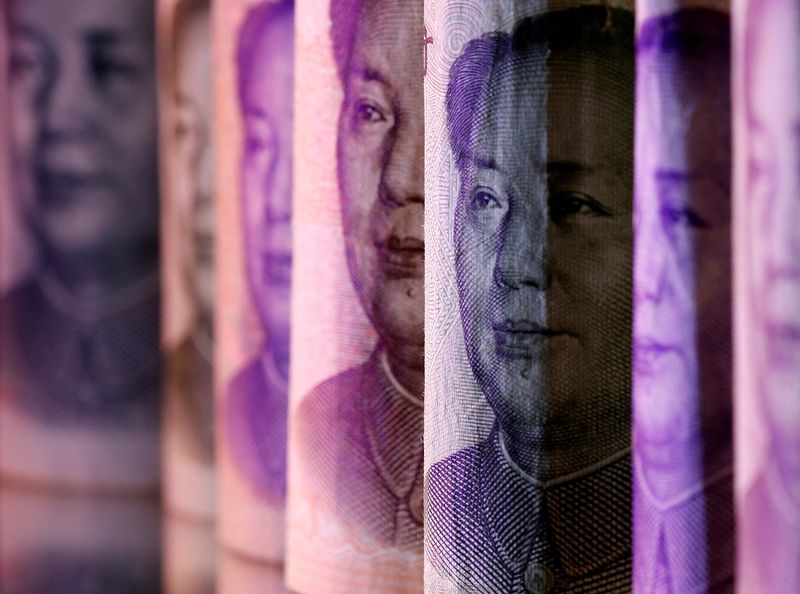
China’s yuan slides to four-month low on Trump’s tariff promise
SHANGHAI (Reuters) – The yuan fell against the U.S. dollar to its weakest in nearly four months after U.S. President-elect Donald Trump said he would impose a 25% tariff on all products from Mexico and Canada, and an additional 10% tariff on goods from China.
Offshore yuan dropped roughly 0.3% on the news to 7.2730 per dollar, its lowest since July 30, while onshore yuan also fell after the market opening.
“The directional impact is clear for the yuan – weaker – but Chinese authorities will be nervous about devaluing too much and encouraging outflows,” said Ben Bennett, head of investment strategy for Asia at LGIM.
Prior to the market opening, the People’s Bank of China (PBOC) set the midpoint rate, around which the yuan is allowed to trade in a 2% band, at 7.1910 per dollar, which was 450 pips firmer than the Reuters’ estimate.
The effectiveness of the fixing as a tool to manage yuan depreciation expectations is limited, said analysts at Nomura in a note.
“We believe that, if onshore spot USD/CNY rises above the 7.30 level, market activity will shift where USD demand strengthens versus sellers,” the Nomura analysts said, adding that this will present a challenge to authorities if they don’t allow the yuan fixing to get weaker.
Nomura suggested to go long dollar against the offshore yuan.
The spot yuan opened at 7.2524 per dollar and was last trading 105 pips lower than the previous late session close at 7.2553 as of 0239 GMT.
Actual tariff announcements and negotiations will drive the yuan in coming quarters, said Liang Ding, an analyst at research firm Macro (BCBA:BMAm) Hive.
“Given the ‘promise made, promise kept’ rhetoric of the Trump campaign, markets may begin to price in additional risk premia related to the second trade war as Trump’s inauguration approaches,” Ding said.
During Trump’s first term as president, the yuan weakened about 5% against the dollar after the initial round of U.S. tariffs on Chinese goods in 2018, and fell another 1.5% a year later when trade tensions escalated.
As part of his pitch to boost American manufacturing during the recent election campaign, Trump said he would impose tariffs of 60% or more on goods from China.
The proposed tariffs, as well as other policies such as tax cuts, are seen as inflationary and likely to keep U.S. interest rates relatively high, hurting currencies of U.S. trading partners.
The dollar’s six-currency index was 0.075% lower at 107.27.
LEVELS AT 02:39 GMT
INSTRUMENT CURRENT UP/DOWN( % DAY’S DAY’S
vs USD -) VS. CHANGE HIGH LOW
PREVIOUS YR-TO-
CLOSE % DATE
Spot yuan 7.2553 -0.21 -2.12 7.2466 7.2568
=cfxs>
Offshore 7.2629 -0.24 -1.91 7.2518 7.273
yuan spot

